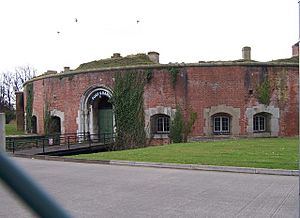Fort Grange facts for kids
Quick facts for kids Fort Grange |
|
|---|---|
 |
|
| Type | Palmerston Fort |
| Location | Gosport |
| OS grid reference | SU 59128 00221 |
| Area | Hampshire |
| Built | 1858–1863 |
| Architect | William Crossman |
| Owner | Ministry of Defence |
|
Listed Building – Grade II
|
|
| Official name: Fort Grange, Gosport | |
| Designated | 20 Apr 1983 |
| Reference no. | 1233816 |
| Lua error in Module:Location_map at line 420: attempt to index field 'wikibase' (a nil value). | |
Fort Grange is a historic building located in Gosport, England. It is one of the famous Palmerston Forts, which were built a long time ago to protect Britain. Work on Fort Grange began in 1858 and was finished by 1863.
Contents
What is Fort Grange?
Fort Grange was built as part of a large defence plan for Gosport. It worked with other forts like Fort Brockhurst, Fort Elson, Fort Rowner, and Fort Gomer. Together, these forts created a strong protective line for the area.
Why Were the Palmerston Forts Built?
In the mid-1800s, Britain was worried about possible attacks from other countries. Lord Palmerston, who was the Prime Minister, believed Britain needed strong coastal defences. He ordered many forts to be built around the country's important ports and naval bases. Fort Grange is one of these "Palmerston Forts."
Building Fort Grange
After two other forts, Gomer and Elson, were approved in 1852, it was decided that more forts were needed. Fort Grange was built to fill a gap between them. It is the most southerly of three new forts planned for that area. The fort was designed by William Crossman.
Fort Grange Through the Years
Fort Grange has seen many changes since it was built. It played different roles in protecting the country.
Early Military Use
In 1914, a military unit called the 23 (Siege) Company Royal Garrison Artillery was based at Fort Grange. This unit helped create other important artillery batteries. From 1910, the fort was also used as a military headquarters.
A School for Pilots
In 1917, Fort Grange became home to the Fort Grange Aerodrome. This was where Robert Smith-Barry started his special "School of Special Flying." It was a place where pilots learned advanced flying skills.
Fort Grange's Defences
In 1916, the fort was armed with a 1-pounder heavy anti-aircraft gun. This gun was on a special carriage, meaning it could be moved around. It was used to defend against enemy aircraft.
Fort Grange Today
Fort Grange is a Grade II Listed Building. This means it is an important historic site that is protected. It looks very similar to Forts Brockhurst and Rowner.
While the main structure of the fort is still intact, some parts have changed. The earthworks, which are the defensive mounds of earth, have been reduced. Also, much of the moat, which was a ditch filled with water around the fort, has been filled in.
By 1983, the fort was no longer actively used by the military and was in disrepair. However, in 1984, Fort Grange found a new purpose. It became the home of the HMS Sultan Royal Naval Volunteer Cadet Corps. It continues to be used by them today, helping to train young people.
 | Toni Morrison |
 | Barack Obama |
 | Martin Luther King Jr. |
 | Ralph Bunche |

